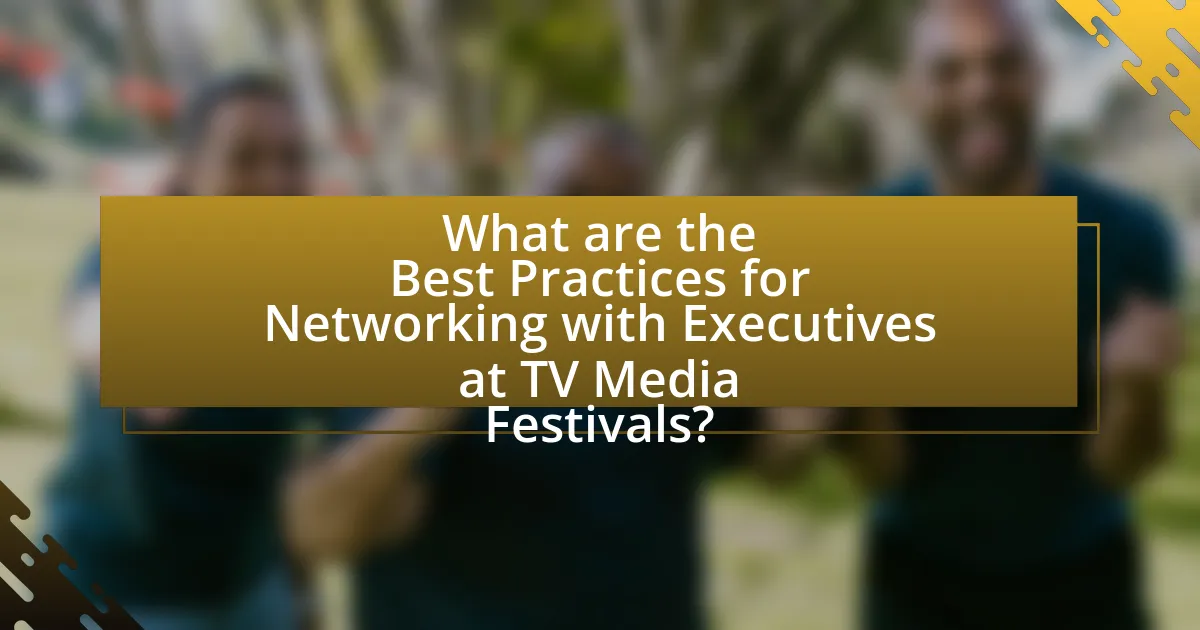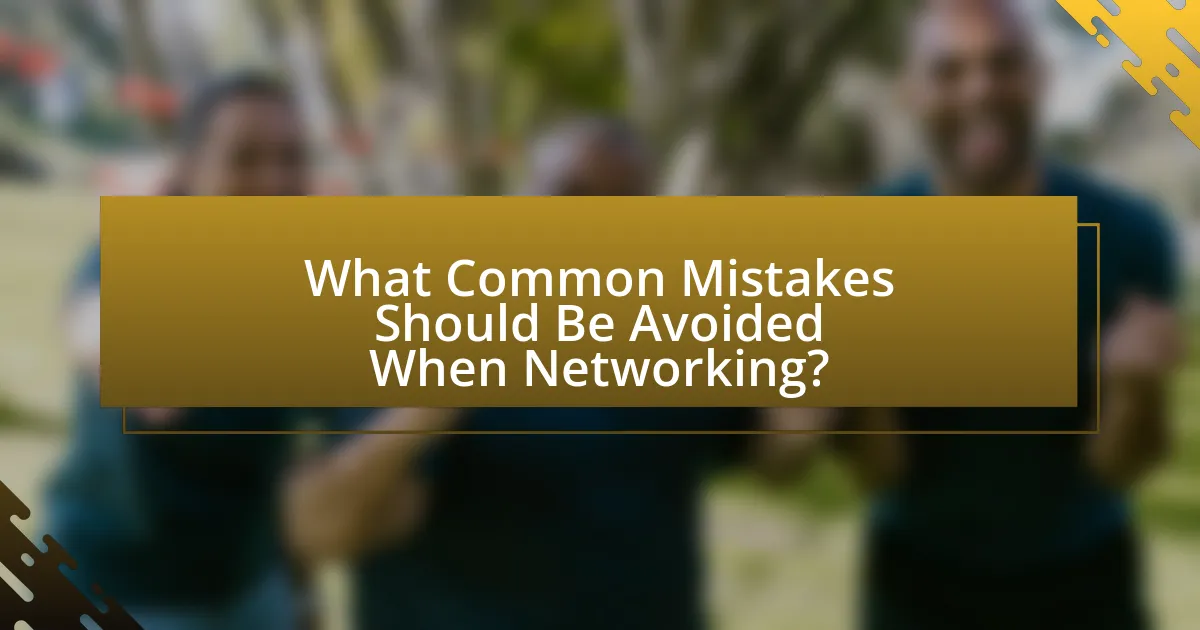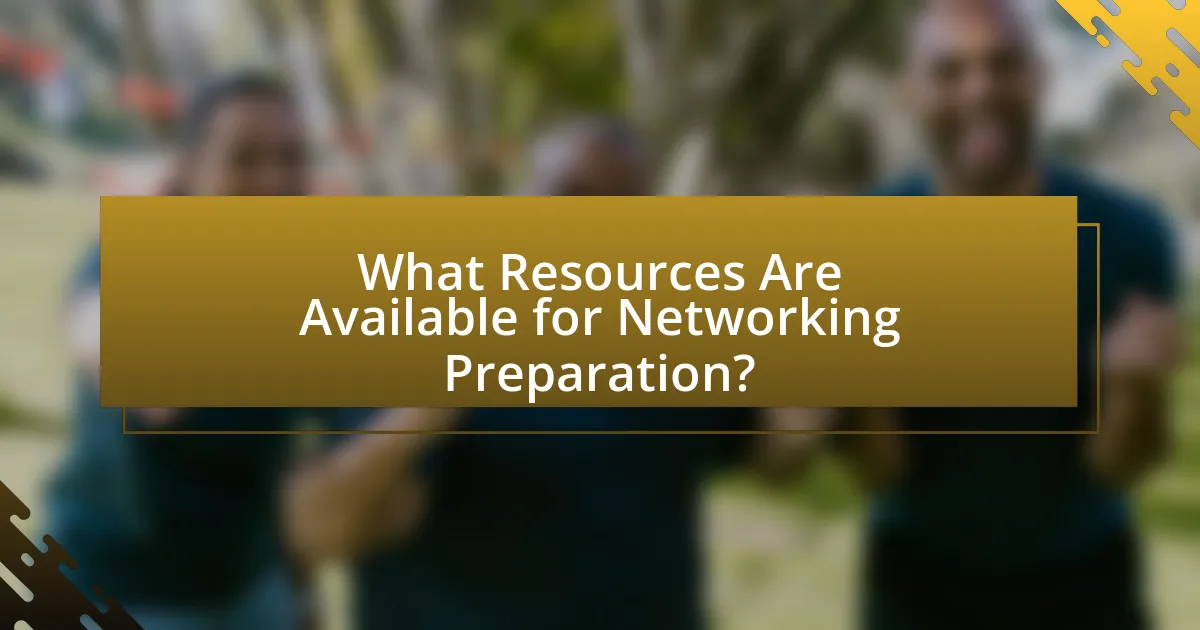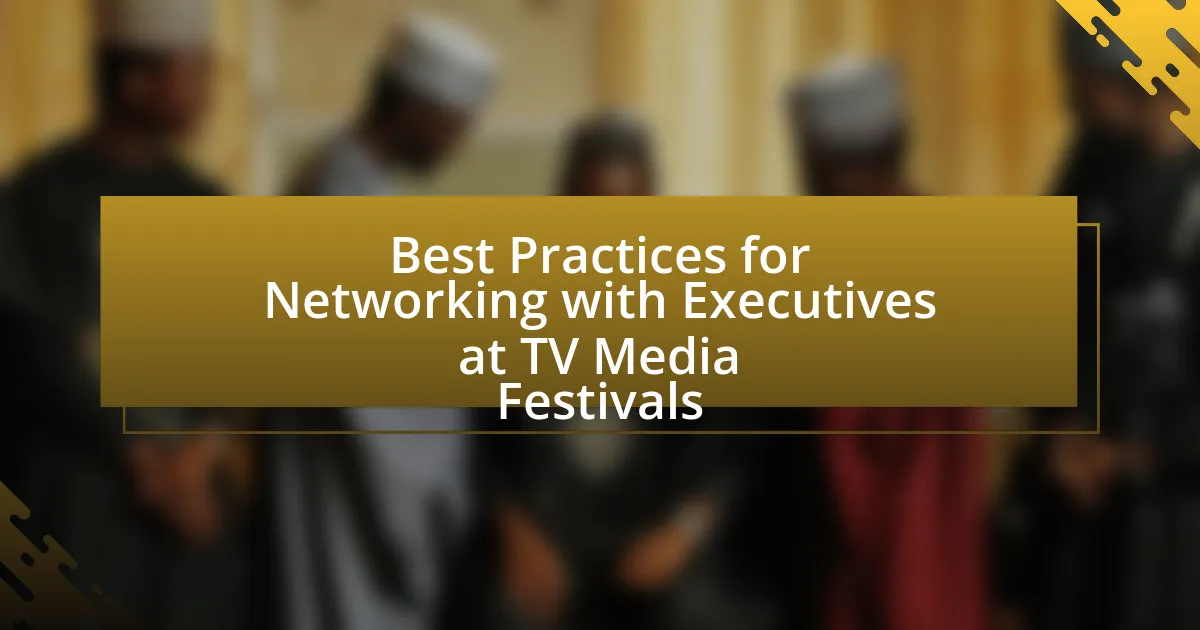The article focuses on best practices for networking with executives at TV media festivals, emphasizing the importance of preparation, meaningful engagement, and personalized interactions. Key strategies include crafting a clear elevator pitch, researching attendees, and initiating insightful conversations to foster connections. It highlights the significance of networking in career advancement, providing insights into the roles of influential executives and the opportunities that arise from effective networking. Additionally, the article outlines common mistakes to avoid and offers practical tips for maximizing networking experiences, including the use of social media and follow-up techniques.

What are the Best Practices for Networking with Executives at TV Media Festivals?
The best practices for networking with executives at TV media festivals include preparing a clear elevator pitch, researching attendees in advance, and engaging in meaningful conversations. Executives appreciate concise and relevant introductions that highlight your unique value proposition. Researching attendees allows you to tailor your discussions and demonstrate genuine interest, which can lead to more impactful connections. Engaging in meaningful conversations involves asking insightful questions and actively listening, fostering a rapport that can lead to future opportunities. These practices are supported by industry insights indicating that personalized interactions significantly enhance networking success at such events.
Why is Networking Important at TV Media Festivals?
Networking is important at TV media festivals because it facilitates connections that can lead to career opportunities, collaborations, and industry insights. These festivals gather a diverse group of professionals, including executives, creators, and influencers, creating an environment ripe for relationship-building. According to a study by the National Association of Broadcasters, 70% of industry professionals credit networking as a key factor in their career advancement. This statistic underscores the significance of establishing contacts and exchanging ideas in a dynamic setting, ultimately enhancing one’s visibility and potential within the industry.
What opportunities does networking provide for professionals in the TV media industry?
Networking provides professionals in the TV media industry with access to job opportunities, collaborations, and industry insights. By connecting with executives and peers, individuals can learn about unadvertised positions, gain referrals, and establish partnerships for projects. Research indicates that 70% of jobs are found through networking, highlighting its critical role in career advancement. Additionally, networking facilitates the exchange of knowledge about industry trends and best practices, which is essential for staying competitive in a rapidly evolving field.
How can networking enhance career growth and visibility?
Networking enhances career growth and visibility by creating opportunities for professional connections and collaborations. Engaging with industry peers and executives can lead to job referrals, mentorship, and access to exclusive opportunities. According to a LinkedIn survey, 85% of jobs are filled through networking, highlighting its critical role in career advancement. Additionally, networking increases visibility within the industry, allowing individuals to showcase their skills and expertise, which can lead to recognition and new career prospects.
Who are the Key Executives to Network with at TV Media Festivals?
Key executives to network with at TV media festivals include network executives, production company heads, and content acquisition managers. These individuals play crucial roles in decision-making processes regarding programming and partnerships. For instance, executives from major networks like NBC, ABC, and CBS often attend these festivals to scout new talent and content. Additionally, heads of production companies such as Warner Bros. and Sony Pictures are pivotal for collaboration opportunities. Engaging with content acquisition managers from streaming platforms like Netflix and Hulu is also essential, as they are responsible for acquiring new shows and films. Networking with these key figures can lead to valuable connections and potential career advancements in the media industry.
What roles do executives play in the TV media landscape?
Executives in the TV media landscape primarily serve as decision-makers who shape content strategy, oversee production, and manage financial resources. They are responsible for determining which shows get produced, allocating budgets, and guiding the creative direction of programming. For instance, executives at major networks like NBC or HBO evaluate scripts, negotiate contracts, and analyze audience data to ensure that their programming aligns with viewer preferences and market trends. Their leadership directly influences the success of television projects, as evidenced by the fact that shows with strong executive backing often achieve higher ratings and critical acclaim.
How can you identify influential executives at these festivals?
Influential executives at festivals can be identified by their visibility, engagement in discussions, and participation in high-profile panels or events. These executives often hold leadership positions in major companies, which can be verified through their professional profiles on platforms like LinkedIn or industry publications. Additionally, their influence is reflected in the number of followers they have on social media and their ability to attract media attention, as evidenced by coverage in trade publications and news outlets.
What Strategies Can Be Employed for Effective Networking?
Effective networking strategies include building genuine relationships, leveraging social media, and attending industry events. Building genuine relationships involves actively listening and engaging in meaningful conversations, which fosters trust and rapport. Leveraging social media, particularly platforms like LinkedIn, allows professionals to connect with industry leaders and share relevant content, enhancing visibility and credibility. Attending industry events, such as TV media festivals, provides opportunities for face-to-face interactions, enabling individuals to showcase their expertise and expand their professional network. According to a study by the Harvard Business Review, 70% of jobs are found through networking, highlighting the importance of these strategies in career advancement.
How should you prepare for networking opportunities at festivals?
To prepare for networking opportunities at festivals, individuals should research the event, identify key attendees, and develop a clear personal pitch. Researching the festival involves understanding its agenda, speakers, and themes, which allows for informed conversations. Identifying key attendees, such as executives or industry leaders, helps focus networking efforts on influential contacts. Developing a personal pitch ensures that individuals can succinctly communicate their background and interests, making interactions more impactful. These strategies are supported by networking studies indicating that preparation significantly increases the likelihood of successful connections.
What are the best ways to initiate conversations with executives?
The best ways to initiate conversations with executives include conducting thorough research on their background and interests, approaching them with a relevant and engaging topic, and utilizing networking opportunities effectively. Executives appreciate when individuals demonstrate knowledge about their work and industry trends, which can be achieved by referencing recent projects or challenges they may face. Additionally, attending industry events, such as TV media festivals, provides a conducive environment for networking, where informal settings can lead to more genuine interactions. Engaging in meaningful dialogue rather than transactional exchanges fosters stronger connections, as evidenced by studies showing that personal rapport significantly enhances professional relationships.
How Can You Follow Up After Networking Events?
To follow up after networking events, send personalized emails to the contacts you made, expressing appreciation for the conversation and referencing specific topics discussed. This approach fosters a connection and demonstrates genuine interest. Research indicates that personalized follow-ups increase response rates by 29%, highlighting the effectiveness of tailored communication in professional networking.
What methods are effective for maintaining connections with executives?
Effective methods for maintaining connections with executives include regular communication, personalized follow-ups, and leveraging social media platforms. Regular communication can be achieved through scheduled check-ins or updates, ensuring that the relationship remains active and relevant. Personalized follow-ups, such as sending tailored messages or sharing relevant industry insights, demonstrate genuine interest and reinforce the connection. Additionally, leveraging social media platforms like LinkedIn allows for ongoing engagement and visibility, facilitating interactions that can strengthen professional ties. These methods are supported by research indicating that consistent engagement and personalized communication significantly enhance professional networking outcomes.
How can you leverage social media for post-event networking?
You can leverage social media for post-event networking by actively engaging with attendees and speakers through platforms like LinkedIn and Twitter. This engagement can include sharing insights from the event, tagging individuals in relevant posts, and participating in discussions related to the event’s themes. Research indicates that 70% of professionals use social media to network after events, highlighting its effectiveness in maintaining connections and fostering relationships. By consistently interacting with your network, you enhance visibility and create opportunities for future collaborations.

What Common Mistakes Should Be Avoided When Networking?
Common mistakes to avoid when networking include failing to research attendees, neglecting to follow up, and focusing solely on personal gain. Researching attendees helps identify shared interests and potential connections, which enhances engagement. Neglecting to follow up after initial meetings can lead to missed opportunities for collaboration or mentorship, as studies show that consistent communication strengthens professional relationships. Focusing solely on personal gain can create a negative impression; networking should be reciprocal, fostering mutual benefits.
What are the pitfalls of ineffective networking at TV media festivals?
Ineffective networking at TV media festivals can lead to missed opportunities for collaboration and career advancement. When individuals fail to engage meaningfully, they risk not establishing valuable connections that could lead to future projects or partnerships. Additionally, ineffective networking can result in a lack of visibility within the industry, making it difficult for professionals to be recognized for their skills and contributions. According to a study by the Harvard Business Review, 70% of jobs are found through networking, highlighting the critical importance of effective relationship-building in career progression.
How can over-enthusiasm hinder networking efforts?
Over-enthusiasm can hinder networking efforts by overwhelming potential connections and creating discomfort. When individuals exhibit excessive excitement, they may dominate conversations, making it difficult for others to engage or express their thoughts. This behavior can lead to perceptions of insincerity or desperation, which may deter executives from forming meaningful relationships. Research indicates that effective networking relies on balanced interactions, where both parties feel valued and heard, underscoring the importance of moderation in enthusiasm during networking scenarios.
What are the consequences of not doing proper research on executives?
Not doing proper research on executives can lead to significant misalignment in networking efforts, resulting in missed opportunities and ineffective communication. Without understanding an executive’s background, interests, and current projects, individuals may fail to engage meaningfully, which can damage potential relationships. For instance, a lack of knowledge about an executive’s recent initiatives may lead to irrelevant discussions, causing the individual to appear uninformed or unprepared. This can ultimately hinder career advancement and limit access to valuable industry insights and collaborations.
How Can You Make a Lasting Impression on Executives?
To make a lasting impression on executives, focus on demonstrating value through insightful conversations and tailored solutions. Engaging executives with relevant industry knowledge and asking thought-provoking questions showcases your expertise and interest in their challenges. For instance, a study by the Harvard Business Review indicates that executives appreciate interactions that lead to actionable insights, enhancing their perception of your professionalism and competence. Additionally, following up with a personalized message that references your discussion can reinforce your connection and keep you top-of-mind.
What techniques can help you stand out during conversations?
To stand out during conversations, actively engage by using open-ended questions and demonstrating genuine interest in the other person’s responses. This technique encourages deeper dialogue and shows that you value their perspective, which can create a memorable interaction. Research indicates that effective conversationalists often utilize active listening and reflective responses, enhancing rapport and connection. For instance, a study published in the Journal of Personality and Social Psychology found that individuals who ask questions and show curiosity are perceived as more likable and engaging.
How important is personal branding in networking?
Personal branding is crucial in networking as it establishes an individual’s identity and reputation within their industry. A strong personal brand enhances visibility and credibility, making it easier to connect with key stakeholders and executives. According to a study by LinkedIn, 85% of jobs are filled through networking, highlighting the significance of personal branding in creating opportunities. Furthermore, individuals with a well-defined personal brand are perceived as more trustworthy and knowledgeable, which can lead to stronger professional relationships and collaborations.

What Resources Are Available for Networking Preparation?
Resources available for networking preparation include industry-specific workshops, online courses, networking events, and professional organizations. Workshops often provide hands-on experience and insights from industry leaders, while online courses can enhance skills in communication and relationship-building. Networking events, such as conferences and seminars, facilitate direct interactions with executives, allowing for meaningful connections. Professional organizations, like the National Association of Broadcasters, offer resources, mentorship programs, and networking opportunities tailored to media professionals. These resources collectively equip individuals with the necessary tools and knowledge to effectively network with executives at TV media festivals.
What tools can assist in researching executives before festivals?
Tools that can assist in researching executives before festivals include LinkedIn, ZoomInfo, and industry-specific databases. LinkedIn provides detailed professional profiles, allowing users to view executives’ career histories, connections, and interests. ZoomInfo offers comprehensive business information, including contact details and company insights, which can help in understanding executives’ roles and responsibilities. Additionally, industry-specific databases like Variety Insight or IMDb Pro provide access to executive credits and project involvement, enhancing knowledge about their work and influence in the media sector. These tools collectively enable effective preparation for networking opportunities at festivals.
How can networking apps enhance your experience at TV media festivals?
Networking apps can significantly enhance your experience at TV media festivals by facilitating connections with industry professionals and streamlining communication. These applications allow attendees to identify and reach out to key executives, schedule meetings, and share contact information efficiently. For instance, a study by the Event Marketing Institute found that 84% of event attendees use networking apps to connect with other participants, leading to increased collaboration opportunities. By leveraging these tools, festival-goers can maximize their networking potential, ensuring they engage with influential figures and gain valuable insights into the industry.
What role do industry publications play in networking preparation?
Industry publications serve a crucial role in networking preparation by providing insights into trends, key players, and industry standards. These publications often feature interviews, case studies, and articles that highlight successful networking strategies and events, enabling professionals to identify potential contacts and understand the context of their interactions. For example, a report from the International Journal of Media Management indicates that professionals who engage with industry publications are 30% more likely to establish meaningful connections at networking events. This demonstrates that staying informed through these resources enhances one’s ability to network effectively within the TV media landscape.
What Tips Can Help You Maximize Your Networking Experience?
To maximize your networking experience at TV media festivals, actively engage with attendees by initiating conversations and asking insightful questions. This approach fosters genuine connections and demonstrates your interest in others’ work. Research indicates that effective networking can lead to valuable partnerships and opportunities; for instance, a study by the Harvard Business Review found that 70% of jobs are found through networking. Additionally, follow up with new contacts after the event to reinforce relationships and explore potential collaborations.
How can you effectively manage your time during networking events?
To effectively manage your time during networking events, prioritize your goals and create a structured plan. Start by identifying key individuals or companies you want to connect with, which allows you to focus your efforts on meaningful interactions. Allocate specific time slots for each conversation, ensuring you remain aware of the event schedule and your commitments. Research shows that attendees who set clear objectives and time limits for discussions are more likely to achieve their networking goals, as they can engage more purposefully and avoid aimless mingling.
What are the best practices for engaging in meaningful conversations?
The best practices for engaging in meaningful conversations include active listening, asking open-ended questions, and demonstrating empathy. Active listening involves fully concentrating on the speaker, which fosters a deeper connection and understanding. Asking open-ended questions encourages elaboration and insight, allowing for richer dialogue. Demonstrating empathy by acknowledging the speaker’s feelings and perspectives enhances trust and rapport. Research indicates that effective communication skills, such as these, significantly improve networking outcomes, particularly in professional settings like TV media festivals, where building relationships is crucial for success.

Leave a Reply